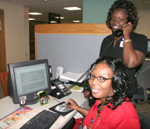Service recovery provides tools,
techniques
by Cindy
AbolePublic Relations
Helping employees practice their best efforts as they assist patients and families or when expectations have not been met is the aim of service recovery.
Established as one of 11 service teams supporting the Medical Center’s MUSC Excellence initiative, the program recognizes workplace excellence and promotes the use of simple techniques and tools as part of a comprehensive plan. Simply put, to identify opportunities for better customer service. Its goal is to provide these services in a quick and effective method while incorporating a mechanism for reporting such events.
 RT patient
registration representatives Elonda Kinloch, right, and Stacy Sykes
answer questions from a patient to complete a service recovery action
report.
RT patient
registration representatives Elonda Kinloch, right, and Stacy Sykes
answer questions from a patient to complete a service recovery action
report.“Our committee defined very early what we wanted to accomplish,” said Carol Younker, Medical Center Risk Management and Service Recovery Team leader. “We wanted to help establish MUSC as a provider of choice in patient satisfaction, which is one of the key initiatives of the hospital’s tactical plan. We needed to create a policy that helps employees feel empowered to act upon service deficiencies as part of the hospital’s service recovery process.”
According to Younker, the policy teaches hospital staff how to recognize and resolve situations using the proper tools to assist patients and their families.
Starting in August, Medical Center employees were introduced to service recovery scripts featuring the LEAD technique—Listen, Empathize, Apologize and Deliver. LEAD allows practitioners to listen attentively to concerns; empathize with the customer; apologize for any inconvenience, miscommunications or bad experience; and deliver alternatives that can resolve a situation. Combined with the Excellence program’s best practice technique known as AIDET (Acknowledge, Introduce, Duration, Explanation and Thank You), trained staff can practice using “key words at key times” philosophy as a tool to help communicate clear, consistent messages across the organization.
At times, problems can arise that directly involve patients, from canceled appointments and procedures, lengthy waits and delays, to staff failures in communications and customer service values may require immediate attention.
“By teaching any of these simple techniques, we expect to give employees the confidence to step forward once they see someone who is unhappy and respond to them,” Younker said. “Rather than ignoring it or running away, employees will eventually feel comfortable to step up in their response and take action immediately.”
Ambulatory Care registration and clinical staff in Rutledge Tower clinics have stepped up to the challenge of providing excellent customer service since last fall. Using a combination of the LEAD technique and AIDET, employees regularly practice service recovery techniques and are responsive to patient needs and situations.
“Our level of training empowers staff to recognize and resolve patient/family situations quickly,” said Sharon Mazyck, Clinical Business Operations manager, Ambulatory Care.
In addition to hospitalwide training, Mazyck also credits small reinforcement groups within her department with strengthening practices and examples of service recovery efforts in Ambulatory Care.
An effective tool distributed to more than 120 inpatient/outpatient clinical locations is the Service Recovery toolkits. The tool kits contain, for example, a variety of items from food coupons to the hospital cafeteria or nearby food outlets. Use of the tool kit as an alternative incentive to resolve patient issues is encouraged only after key words and recovery practices have been exhausted.
“As an organization, MUSC needs to equip staff with the right tools and items that can be helpful in any situation,” said Mazyck, who also is on the Service Excellence team. “The tool kit sends employees a positive message. It says ‘we hear you’ and managers understand what frontline staff face each day as they deal with customers and patients.”
About 95 percent to 98 percent of all service recovery situations could be handled using words alone, according to Younker. Additionally, the reporting of service recovery activities is recorded using a service recovery action report form. This practice allows managers and team leaders to review, monitor and evaluate service recovery efforts and provides valuable feedback within clinical care areas. This, combined with each department’s Press Ganey Patient Satisfaction Survey scores, presents optimum data that departmental groups can use to measure and apply improvements.
More importantly, service recovery reinforces an ideal workplace where employees view MUSC as a great place to work and patients can receive optimum medical care.
“The more people practice service recovery, the easier it becomes to them. It’s part of our institution’s culture change. Service recovery reminds us that each person at MUSC has a responsibility to step up to the plate when the unexpected happens or we haven’t done our best work. It empowers employees toward a path of resolution and success and that’s what excellence is really all about,” Younker said.
Excellence Service Recovery Team
Carol Younker, chair; Lynne Barber, Jennifer Carullo, Stephanie Chomos, Brian Fletcher, Bonnie Jones, Gwen Kearse, Sharon Mazyck, Lisa Mullen-Montgomery and Karen Rankine
Friday, March 16, 2007
Catalyst Online is published weekly,
updated
as needed and improved from time to time by the MUSC Office of Public
Relations
for the faculty, employees and students of the Medical University of
South
Carolina. Catalyst Online editor, Kim Draughn, can be reached at
792-4107
or by email, catalyst@musc.edu. Editorial copy can be submitted to
Catalyst
Online and to The Catalyst in print by fax, 792-6723, or by email to
catalyst@musc.edu. To place an ad in The Catalyst hardcopy, call Island
Publications at 849-1778, ext. 201.